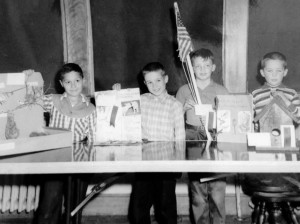My father was an unemployed welder during the 1960 Christmas season. With his last paycheck arriving in late October, my family had accepted that Christmas would be lean. Despite hard times, however, that Christmas remains my all-time favorite.
Two weeks before the annual school Christmas party, my third-grade teacher paired pupils and asked each to bring a small gift to exchange. I was matched with an 8-year-old boy named Herman who lived in an Oakland neighborhood that had been mired in poverty since the 1930s.
During the winter months, Herman’s clothes smelled of creosote and smoke from a woodstove that burned green wood. He was the object of ridicule. “What happens in Hermon’s shanty when a burning piece of wood lands on the floor?” was a commonly heard, mean-spirited joke. “Nothing,” was the punch line, “because his floor is made of dirt.”
My three siblings and I knew that, unlike the poor boy’s family, no matter how difficult Christmas would be for us, at least we lived in a home with wooden floors and indoor plumbing. My mother empathized with Herman’s family because she too had known poverty as a child in rural Maine. She knitted him a pair of wool mittens and socks. In exchange, Herman gave me a hand-painted wooden chickadee, whittled from basswood by his oldest brother.
On Christmas Eve, my uncle John, owner of the Chez Paree, a chic Waterville nightclub in the 1960s, arrived at 8 p.m. with four gifts apiece for my three siblings and me. An hour earlier, my two brothers and sister had joined me in opening one gift. I unwrapped the best present from my parents: a Mickey Mouse watch.
Uncle John’s generosity caused Father to cry in front of his children for the first time. I wasn’t too young to see firsthand that Christmas is gut-wrenching for unemployed parents. My father’s brief emotional collapse was one of those defining moments that, in fortunate families, strengthen bonds between children and parents.
Five decades later, I’ve long since forgotten my uncle’s gifts, but Dad’s words to us children endure: “I’ll make it up to you next year.” Like many Maine families in the early 1960s, we had hit financial hard times. Except for my Uncle John, who wore dapper clothes and drove a new black Cadillac, no one I knew had much money.
My parents grew up in Maine during the Great Depression. In the late 1920s, as a 10-year-old boy, my father’s winter morning chore entailed walking the railroad tracks to collect spilled coal from passing train cars. The coal he carried home in a discarded wooden fruit box helped heat his immigrant Lebanese parent’s apartment near Waterville’s Head of Falls.
My mother grew up on a small Maine dairy farm without electricity or indoor plumbing. Each December in the 1960s, as a reminder of her humble upbringings, she stitched together strings of popcorn in lieu of tinsel and strung them as Christmas ornaments across branches near a cardboard manger displaying Mary and Baby Jesus.
On Christmas morning 1960, a colorful, but poorly wrapped, present stood out from the others under our tree. The gift was a mystery to everyone except me. Although my 4-year-old sister had outgrown her winter boots, my parents couldn’t afford new ones. Hidden in a shoebox under my bed was money I had earned the previous summer picking strawberries, green beans and peas at Penny Hill Farm on Kennedy Memorial Drive (now a doctor’s office complex). I withdrew $8 — nearly a weeks worth of wages at 25 cents per hour — from my shoebox and purchased a pair of boots for my sister. Knowing that boots are a boring gift to a child, I tucked a tiny doll in each boot. Before finding those dolls, my sister could not have been more disappointed had the gift been a bottle of cod liver oil.
What we lacked in presents that Christmas was soon forgotten in the excitement of a bountiful family meal of homemade canned green beans, fluffy mashed potatoes, yeast rolls and two mincemeat pies made with poached venison. The owner of downtown Waterville’s Texaco Station had given the meat to my father. My siblings and I devoured the meal like a litter of hungry wolf pups.
The hand-carved wooden chickadee from Herman was my favorite Christmas gift that year. Other gifts included a sweater that my mother knitted (a keepsake), two shirts made on mother’s sewing machine, a pair of knitted socks from a grandmother, and a hand-me-down cowboy shirt from a cousin. My frugal mother lived the words she often preached: “Use it up, wear it out, make it do or do without.”
Of all my 1960 Christmas gifts, the longest-lasting one defied wrapping. Mother’s love of backyard birds was a gift she unintentionally gave me. On Christmas morning, she mixed black oil sunflower seeds and table scraps in our bird feeder. That afternoon, she was rewarded with the first documented cardinal in central Maine.
She was so smitten with the brilliant red cardinal that during one winter dinner my father teased her about having a new boyfriend. We roared with laughter when my confused 4-year-old sister asked, “Mommy’s boyfriend is a bird?”
Ron Joseph of Waterville is a retired Maine wildlife biologist.

The author is wearing his 1960 Christmas cowboy shirt, mentioned in the column, while standing behind his blue ribbon bird nest science fair project at the Tapley Elementary School in Oakland. Ron Joseph enjoyed a 33-year-career as a Maine wildlife biologist and bird conservation specialist, thanks to his mother’s influence.
Comments are no longer available on this story